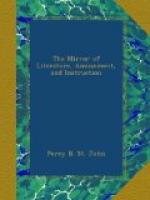The weight of the carriage and its apparatus is estimated at 1-1/2 tons, and its wear and tear of the road, as compared with a carriage drawn by four horses, is as one to six. When the carriage is in progress the machinery is not heard, nor is there so much vibration as in an ordinary vehicle, from the superior solidity of the structure. The engine has a twelve-horse power, but may be increased to sixteen; while the actual power in use, except in ascending a hill, is but eight-horse.
The success of the present improved invention is stated to be decided; but the public will shortly have an opportunity of judging for themselves, as several experimental journeys are projected. If it should attain its anticipated perfection, the contrivance will indeed be a proud triumph of human ingenuity, which, aided by its economy, will doubtless recommend it to universal patronage. Mr. Gurney has already secured a patent for his invention; and he has our best wishes for his permanent success.
* * * * *
HISTORICAL FACTS RELATIVE TO THE EARLY CONDITION OF THE ENGLISH.
(For the Mirror.)
London, in early times (King Ethelred’s reign) consisted only of scattered buildings from Ludgate to Westminster, and none where the heart of the city now is; it was afterwards extended more westward and continued increasing—–eastward being neglected until a more later period. Who can view its present well constructed houses, its numerous elegant squares and terraces, and its general superior appearance, without almost doubting that the inhabitants of Britain once dwelt in the most miserable habitations, regardless in every respect of comfort and cleanliness. Indeed, at an early period we seem to have been in a very wretched condition. Without carrying ourselves too far back, we will look at the state of the English




